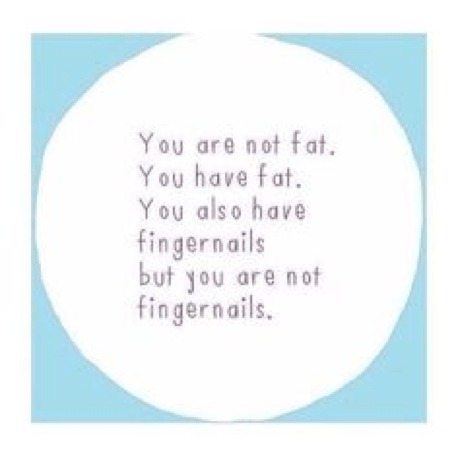What does the word fat mean to you? How does it make you feel when you hear it or use it?
There are so many ways in which this word can be used, but for many people, this tiny three letter word often leaves us feeling negative and plays a huge role in our daily lives.

For some of us, when we use or hear this word, we may feel abused, confused, naughty, angry, scared, ashamed, guilty or humiliated; sometimes at the mercy of other people, but usually through our own derogatory self judgement.
For some of us, fat is our life.
It stops us being who we want to be. It rules every moment of every day. If it’s not fretting about the amount of fat on our bodies, it’s likely to be about the amount of fat in our diets. Is there anything positive about fat at all?
The great news is; yes there is! It may come as a surprise to you, but fat on our body actually plays an important role. Did you know that 60% of the human brain is made up of fat? It also acts as protection for our vital organs, to keep us warm, and to provide us with a source of energy. The bottom line is you need fat on your body. And another little known fact is that women naturally carry more body fat than men. But so many of us obsess about the amount of fat we have on our bodies, wanting to rid ourselves of this ‘stuff’ which we often liken to an unwanted growth.
And what about the fat we eat? What are your beliefs about the fat you eat?
Here are some of the common beliefs about fat in the diet:
· Fat in my diet = fat on my body
· To lose weight, I should eat a very low fat diet
· If I eat fat, I’m a bad girl/boy and have no willpower
· Eating fat will cause heart disease
You can breathe a sigh of relief now, knowing that you’re not alone in feeling those things. But how much truth is there in these beliefs?
I’ve been finding increasingly that by searching the internet, you can find something to back up whatever you want to believe, particularly when it comes to what to eat. Google benefits of low fat diets and benefits of fat in diets and you’re likely to find quite contradictory and confusing information (my advice would be, don’t do it!) So it’s unsurprising that many of us are left in a quandary as to who or which piece of research to believe, and how much fat we should be consuming in our diets.
After numerous years of believing that eating fat will make me fat, I have learnt that we actually do need fat in our diets to be able to function properly as a human being. But why should you believe me over anyone else? Well, I’m no scientist, and I haven’t spent hours in the lab running experiments on rats. But I have lived a virtually no fat diet for around 20 years. I have eaten every low fat product imaginable, and have been poisoned by the numerous artificial substances and sweeteners that are pumped into these foods to make them even remotely palatable. I have been ruled by fat in one way or another for as long as I can remember. And I can now vouch for the incredible benefits my body has seen by introducing fat into my diet.
Do you recognise any of the following symptoms?
· Poor digestion
· Inability to lose weight
· Constipation
· Fatigue
· Dull/dry skin
· Redness around eyes
· Lack of monthly cycle for women
· Moodiness
· Constant hunger – leading to thinking you have a willpower issue
· Craving junk food
· Binge eating
· Stiff or painful joints
· Low sex drive
· Poor cognitive issues
If the answer is yes to any of those it’s quite likely you may be suffering from fat deficiency in your diet. By introducing good fats into my diet, I have eradicated most of these symptoms from which I was suffering. But it’s only with hindsight, I realise just how moody I was, how much my cravings and binge eating were ruling my life and how incredibly painful my digestive issues were.
It was a complete revelation to me that you actually had to have fat in your diet to function properly. Fat in our diet serves the following purposes: helps us with growth, development and repair of body tissues, gives us energy, helps us to absorb vital vitamins and minerals, regulates our appetite (keeps us fuller longer) and helps us to build muscle (which in turn helps burn calories). It also adds flavour to food, and provides us with a high satiety value as it takes a long time to digest.
But what are good and bad fats?
I really don’t like to use this terminology – I believe it just encourages self-abuse when we aren’t able to stick to the rules. I’m not going to go into much depth here, as I truly believe a simple explanation will suffice. We are encouraged to reduce our intake of saturated fats (mainly coming from animal sources including fatty meat, cheese, butter, biscuits, cakes, pastries etc.), and increase our intake of polyunsaturated and monounsaturated fats (primarily from a non-animal source – fish, nuts and seeds etc.) There are certain types of polyunsaturated fats that are essential to the human body, and they cannot be made in the body from other fats, so they have to be provided through the diet. These are known as essential fatty acids (or Omega 3 and Omega 6). These fats play an important role, including protection against heart disease, prevention of blood clots, and enhancing immune responsiveness and can be found in oily fish or vegetable oils such as flaxseed oil.
But how many times have you turned down an avocado or piece of salmon because it has too many calories in it, or gone without dressing on your salad because you haven’t got enough points left for the day?
What does this all mean?
What’s the magic answer? I could tell you exactly how much and what kind of fats to eat on a daily basis based on some arbitrary recommended daily allowances for the average person. But I’m afraid I’m not going to. After all, who is the average person? We are all individual human beings with different DNA, and we are the only people to know what our bodies need. It’s all about trial and error, experimentation and listening to our own bodies. All I will say is if you’re living a diet which is full of low fat foods through a fear of becoming fat, have a go at switching the balance for a bit and see if anything happens. Introducing some essential fatty acids into your diet might just make a whole lot of difference.
If you don’t already, why not experiment with adding a couple of the things from the list below into your diet this week?
Olive oil, sesame oil, coconut oil, macadamia oil, sunflower oil, flaxseed oil, almond oil, walnut oil, avocado, organic nuts and seeds, olives, eggs, oily fish (mackerel or smoked salmon, for example), lean meat.
Or how about swapping low fat produce for the real thing (yoghurt, for example)? The likelihood is you’ll need less of it because it tastes SO much better!
What else could I do?
Although you need a certain amount of fat on your body, many of us are carrying excess weight and despite our best efforts, can’t lose it. Perhaps then, there is a reason other than diet?
This is a bit of an abstract one, but bear with me… Have a think about what other role any excess fat on your body could be playing in your life. For some people it really can be as simple as needing to rebalance macronutrients in their diet, and the excess fat on their body isn’t masking anything else. But I suspect those people are in the minority.
I believe that many people are carrying excess weight for a reason – I believe it’s there – calling for your attention, and asking you to look a little deeper than the superficial layer under your skin.
For some people, their excess fat can be protection from something or someone. It could be covering over an unhealed wound from a traumatic event or experience. It could be masking your feelings about the amount of stress you are dealing with in your life. The list is endless.
This blog merely scratches the surface of such a huge topic. And it’s not going to help you change your opinion about fat overnight. Fat is something so many of us are scared of. But let’s try and see fat as a positive thing. Something we need both on our bodies and in our diets. And perhaps just as importantly; our excess fat and fear of it could be here to draw our attention to what else may be going on in our lives we may need to address. If you’d like any help exploring any of these things, get in touch. I offer one to one coaching to help people work through issues around food and their bodies.
Some final words of wisdom…

You must be logged in to post a comment.